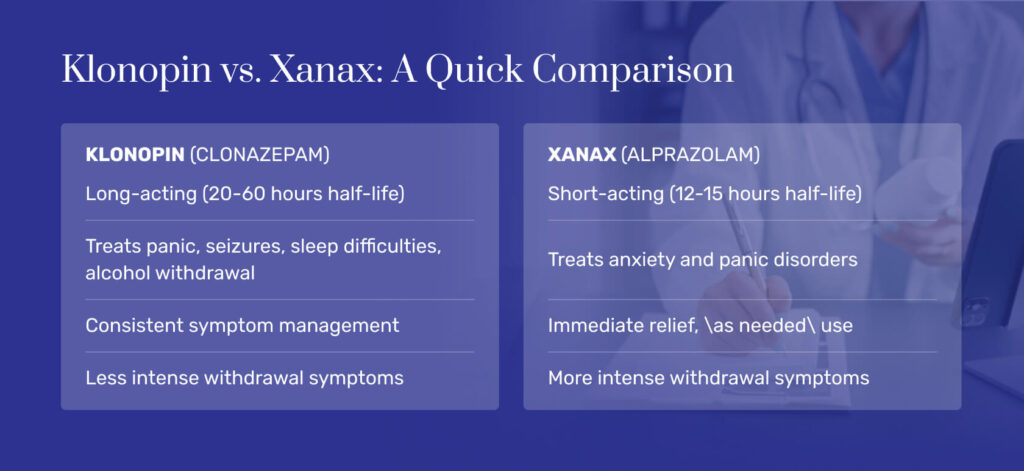The best medication for an individual will depend on their needs and the opinion of their doctor, with both having legitimate medical uses.
The Basics of Klonopin & Xanax
Klonopin and Xanax are two benzodiazepines. Klonopin is a brand name for the drug clonazepam, a drug that is often labeled as a long-acting benzodiazepine, but some experts instead call it an intermediate-acting benzodiazepine. Xanax is a brand name for the drug alprazolam, a short-acting benzodiazepine.
Clonazepam has an elimination half-life of about 20 to 60 hours, whereas alprazolam has a shorter half-life of 12 to 15 hours. This is how long it takes most bodies to eliminate 50 percent of a substance from their system, with it taking about four to five half-lives for greater than 90 percent of a drug to generally be eliminated.
Clonazepam is commonly used to treat panic and certain seizure disorders. It is also sometimes used to treat difficulties sleeping and alcohol withdrawal. Similarly, alprazolam is used to help treat anxiety disorders and panic disorders.
How Do These Drugs Work?
Because both drugs are benzodiazepines, they work in a fundamentally similar way.
Benzodiazepines enhance the effect of a particular neurotransmitter in the brain, resulting in a sedative-hypnotic effect. This helps to calm abnormal brain activity, which is the primary way these drugs help to treat the various conditions they’re used for.

Key Differences Between Xanax & Klonopin
Xanax is short-acting, meaning it has more immediate effects that don’t last as long. Xanax has the potential to cause more intense withdrawal symptoms, as the body eliminates it more quickly and has less time to adjust to its absence if a person has already developed dependence.
As a short-acting drug, Xanax also cannot be used in identical ways to Klonopin. For example, Xanax is not generally prescribed to help with seizures.
One advantage of Xanax is it makes a better “as needed” medication, where an individual takes it in situations where they need its effect rather than needing its assistance consistently throughout the day. Because Xanax acts quickly, it can be used this way where Klonopin generally cannot.
Is One Drug More Effective?
Xanax and Klonopin have different use cases despite sharing some overlap in the conditions they treat.
Xanax is short-acting, meaning its effects are felt more quickly. For many individuals, this isn’t a problem, and its short-acting nature means Xanax can provide more immediate relief than Klonopin can, which is often advantageous or even necessary.
Klonopin is long-acting, which means it takes longer to take effect but also that an individual needs to take less throughout the day. For people who need consistent symptom management, this can be useful. Klonopin can also help treat some conditions that Xanax cannot generally be used for, such as seizure management.
Is Either Drug More Addictive?
There don’t appear to have been any studies directly comparing the addictiveness of Xanax and Klonopin. Anecdotal evidence also seems mixed.
Xanax will theoretically cause more intense withdrawal symptoms in people going through withdrawal, which makes it more difficult to quit suddenly and may cause a person to continue taking it beyond how much they need or is recommended. Klonopin is long-acting, so withdrawal is likely to be less intense but may also be significantly longer lasting.
If someone is physically dependent on Xanax, they may be transitioned to a long-acting benzodiazepine before a tapered withdrawal process is initiated.
Both drugs require caution when used and have the potential for abuse and addiction. However, both drugs are also considered valid medications for their use cases, backed by evidence supporting their use.
Dependence and addiction become more likely if the drugs aren’t used as prescribed or if they are taken for longer than a few weeks, which is generally avoided by prescribing doctors when possible. Dependence can form quickly if they are used for longer periods.
Warnings & Side Effects
Common side effects associated with benzodiazepine use include the following:
- Dizziness
- Drowsiness
- Changes in appetite
- Changes in sex drive or ability
- Constipation
- Difficulty concentrating
- Difficulty urinating
- Dizziness
- Dry mouth
- Headache
- Increased salivation
- Irritability
- Joint pain
- Lightheadedness
- Nausea
- Talkativeness
- Tiredness
- Weight changes
Importantly, benzodiazepines have a sedative effect, meaning they can slow a person’s breathing and make them tired. Used as intended, this is generally not a major concern for healthy individuals. However, it can become dangerous if these drugs are mixed with other drugs or abused, potentially slowing down a person’s breathing enough to become dangerous.
An individual should also be careful when driving or operating heavy machinery while using benzodiazepines. These medications can impact your coordination and reflexes in a way similar to alcohol.
Which Drug Is Better?
Neither is better than the other in every definitive way. The two medications are in continued use for this very reason. They both have legitimate purposes in medicine.
In some cases, an individual may even start on one and eventually switch to the other. It depends on a person’s needs, the opinions of their doctor, and the medication that works best for them. The choice will be individual.
- Alprazolam. (May 2021). National Library of Medicine.
- Benzodiazepine Addiction. UCLA Jane & Terry Semel Institute for Neuroscience & Human Behavior.
- Clonazepam (Klonopin). (September 2021). National Alliance on Mental Illness.
- Sleeping Pills and Minor Tranquillisers. (April 2021). Mind.
- A Review of Alprazolam Use, Misuse, and Withdrawal. (January–February 2018). Journal of Addiction Medicine.
- Challenges of the Pharmacological Management of Benzodiazepine Withdrawal, Dependence, and Discontinuation. (February 2018). Therapeutic Advances in Psychopharmacology.




